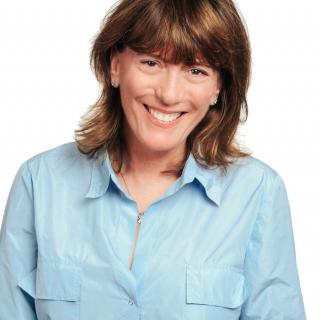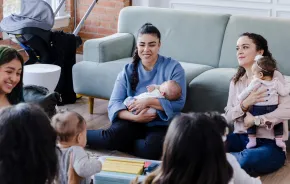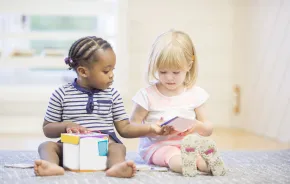Jesse Gillman is a 21-year-old who grew up in Bellevue with his parents, Marcy and Jeff, twin brother, Adam, and older sister, Talya. Born at 26 weeks and weighing a little more than 1.5 pounds, Jesse suffered a brain hemorrhage, lost vision in one eye and was on a ventilator for seven months. He came home at 11 months with a feeding tube and needed intervention to help him walk and speak. We spoke with Jesse and with his mother, Marcy.
 What should kids in your generation be most concerned about?
What should kids in your generation be most concerned about?
Jesse: Young people in my generation are better off. We have more opinions about things happening and we have ways like Facebook to voice our opinions — and my generation helped get President Obama elected.
How do you stay current with the news?
I start with NPR in the morning, I am on the internet and watch TV.
When someone says “special needs,” what does that mean to you?
For me, it does not really mean much. People understand me. People get it or they don’t. To me, having a disability, there are advantages and disadvantages. I have a lot of support from people who know me, like my parents and teachers and people in the program who help structure my needs. Disadvantages? I am blind in one eye, I wish I could drive. But I find other ways to find transportation and get around.
You have a great attitude! Were you born with that?
Ask my parents, I don’t know. When I was younger, I used to hate eating food and I didn’t like my hearing aids. But I grew up.
I remember my mom telling me stories when I was little -- that I would throw food on the walls and floors and at my grandma and grampa whenever we would go out to eat. If I made a big mess, my grandpa would give an extra tip. I would throw my hearing aides in the street and my mom would freak out!
You have been honored for your volunteer work; please share that with our readers.
I did Friendship Circle, where you are working with kids who have special needs. We play games with them and do music and art with them.
Here's how I think about it: you are with a person who is matched up with you, that is either high functioning or not functioning at all. If I am matched with a high functioning kid, I can relate. But if not, it can be kind of hard. I don't know sign language, so I am usually with high functioning kids.
How does your devotion to sports come out -- and how do you keep up with all the stats and facts?
I am pretty much a bandwagon fan, so if the team's winning, I like them! [I keep up with] the internet, TV -- who is winning, stats, lengthy conversations about teams and stats.
What makes you angry? Do you ever get mad?
When my teams lose, or when I hear things in the news, when people say things that I don't necessarily agree with. It frustrates me that there is not compromise across the aisles of Congress.
What would you like people to know about kids and adults with special needs?
Every kid with special needs is different in their own way. They learn in different ways, and each one has a different way to communicate. If people have never been around disabilities, you have to ask questions to understand it. Learn something about it yourself, and expose your kids to people and kids with special needs.
What are your ambitions?
It is hard to get a job now with my interests, like current events, because people would not maybe accept me. I have a job coach, and the school district contracts with her. She will try to help figure out a way for me to get a job using my strengths.
How do you get to work?
I go on the public bus to Ace Hardware. I have two jobs. One is a paid one, and one is an unpaid internship. The paid job is the Redmond Rotary. At Rotary, I help set up for their meetings each Tuesday and I welcome people.
What happens after this transitional program ends?
I want to be in a college program like my friends are all doing now and be on a campus. Highline Community College may have a program for kids with disabilities. I would take political science and econ classes. Econ is pretty complicated, but a lot of people don’t fully understand the concept of the economy.
What has been a major achievement for you?
Going to overnight camp at Camp Ramah in Ojai, California. I have gone there since I was about 12 or 13, so I have been going for years. Next summer is my last year.
Interview with Marcy Gillman, Jesse's mother
As a parent of a young adult with special needs, what should people know?
Marcy: There are different phases of this journey. When it begins and you learning that your child has special needs you go through a lot emotionally. What helped was being open to possibilities. Jesse did not have a clearly named disability, and it's never been clearly defined.
I always hung onto the idea that a lot was possible and his development has always been amazing. As children get older, the decisions and things you have to think about change. While it is helpful to hear things from other parents, their story is not going to be your story. The challenges they face may be very different for your child.
The kind of relationship you develop with people, such as the amazing teachers and therapists, have been very helpful. Learning to trust other people can have an impact on your life. Life looks differently than when you have a "typical" child. Seeing people and surrounding yourselves with people who help see the possibilities for your child is very helpful.
In recent years, what has been most challenging as Jesse grew to adulthood?
The time when they are teenagers and the formal school programs you have relied on are about to end. This transition time is very stressful. You get comfortable with a teacher or a school, and then you have to make plans for what comes next. It's important to understand that those transition times are going to be difficult, but you will get through them. It's helpful to connect with others who have done this.
Jesse just turned 21 recently. How do you feel about that?
I am feeling confident, but it's scary that his structured days will be ending. Trying to piece together the right meaningful next steps is challenging.
If the main goal is not necessarily a realistic one, we can get as close to that as possible. For instance, Jesse really wants to go to college. If he can't go to the University of Washington as a student, we will do our best to take him to UW games and to UW Hillel so that he is around other students. We know what types of settings are meaningful and exciting for Jesse and we add those experiences when we can.
What message would you want families to hear who don't have this direct experience with special-needs kids?
Our culture has gotten much more accepting. Open mindsets and media have helped people have more sensitivity. Jesse has not really been the target of bullying. that is partly due to his ability to connect with kids and adults.
One way families can be helpful is going beyond what they do and include kids with special needs in activities outside of school. One of the more difficult parts of this is having a child that is trying to make social connections.
Jesse in some ways has always been a litlte too high functioning. When asked, "What disabilities do you have?" he says, "Hard of hearing and eye sight." This is Jesse's view, so he has good self-esteem.
As a parent, what are your biggest fears?
What is going to happen when we are not here. Jesse does not have that fear. We don’t want to put any extra burden on Jesse’s siblings. We have the same hopes for Jesse as for our other children: to have meaningful relationships, to be happy and successful, and to feel a sense of accomplishment. It really is the same as for our other kids, we just know the pathway will be different.
What qualities do you cherish in your son?
He has been so resilient; whatever the obstacle has been, he has pushed his way through. He has such determination to be in the world. And I think it’s fantastic that he has such positive self-esteem — and we love his sense of humor.
What has been most challenging as Jesse grew to adulthood?
The time when he was a teenager and the formal school programs we relied on were about to end. You get comfortable with a teacher or a school, and then you have to make plans for what comes next. Jesse really wants to go to college. Since he can’t go to the University of Washington, we will do our best to take him to UW games and to UW Hillel so that he is around other students.
What advice would you give to other parents whose kids have special needs?
In Jesse’s life, any act of kindness from another kid has meant so much. If parents can encourage that in their own kids, it goes well beyond what you can imagine for the child and family receiving this kindness. Taking a kid out for pizza or inviting him to a birthday party, it’s such a blessing. Those things don't automatically happen and it takes a parent to encourage beyond the moment's kindness. It just goes so far. I think back to those things happening when Jesse was young, and I remember them all.




 Jesse Gillman is a 21-year-old who grew up in Bellevue with his parents, Marcy and Jeff, twin brother, Adam, and older sister, Talya. Born at 26 weeks and weighing a little more than 1.5 pounds, Jesse suffered a brain hemorrhage, lost vision in one eye and was on a ventilator for seven months. He came home at 11 months with a feeding tube and needed intervention to help him walk and speak. We spoke with Jesse and with his mother, Marcy.
Jesse Gillman is a 21-year-old who grew up in Bellevue with his parents, Marcy and Jeff, twin brother, Adam, and older sister, Talya. Born at 26 weeks and weighing a little more than 1.5 pounds, Jesse suffered a brain hemorrhage, lost vision in one eye and was on a ventilator for seven months. He came home at 11 months with a feeding tube and needed intervention to help him walk and speak. We spoke with Jesse and with his mother, Marcy.






